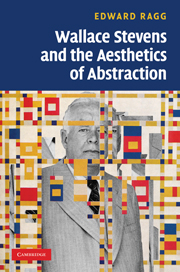Book contents
- Frontmatter
- Contents
- Acknowledgements
- List of Abbreviations
- Introduction: ‘Stevensian’ and the question of abstraction 1935–2009
- 1 The abstract impulse: from anecdote to ‘new romantic’ in Harmonium (1923) and Ideas of Order (1935)
- 2 The turn to abstraction: Owl's Clover (1936) and the ‘un-locatable’ speaker in The Man with the Blue Guitar (1937)
- 3 The ‘in-visible’ abstract: Stevens' idealism from Coleridge to Merleau-Ponty
- 4 Abstract figures: the curious case of the idealist ‘I’
- 5 Abstract appetites: food, wine and the idealist ‘I’
- 6 The pure good of theory: a new abstract emphasis
- 7 Bourgeois abstraction: poetry, painting and the idea of mastery in late Stevens
- Bibliography
- Index
7 - Bourgeois abstraction: poetry, painting and the idea of mastery in late Stevens
Published online by Cambridge University Press: 04 August 2010
- Frontmatter
- Contents
- Acknowledgements
- List of Abbreviations
- Introduction: ‘Stevensian’ and the question of abstraction 1935–2009
- 1 The abstract impulse: from anecdote to ‘new romantic’ in Harmonium (1923) and Ideas of Order (1935)
- 2 The turn to abstraction: Owl's Clover (1936) and the ‘un-locatable’ speaker in The Man with the Blue Guitar (1937)
- 3 The ‘in-visible’ abstract: Stevens' idealism from Coleridge to Merleau-Ponty
- 4 Abstract figures: the curious case of the idealist ‘I’
- 5 Abstract appetites: food, wine and the idealist ‘I’
- 6 The pure good of theory: a new abstract emphasis
- 7 Bourgeois abstraction: poetry, painting and the idea of mastery in late Stevens
- Bibliography
- Index
Summary
What is terribly lacking from life today is the well developed individual, the master of life, or the man who by his mere appearance convinces you that a mastery of life is possible.
the classic hero
And the bourgeois, are different, much.
The classic changed. There have been many.
And there are many bourgeois heroes.
Peter [Lee] lives a good deal out of books. Recently I got a letter from him in which he described the square in Fribourg opposite the post office as full of country people selling butter and vegetables, chickens and eggs […] [H]e described the town itself as full of school girls not only from this country but from various parts of Europe, not to speak of Egypt. He wound up with the explanation: Il faut tenter vivre […] I came across this very expression in something connected with Mallarmé. – I suppose, therefore, that the butter and vegetables and chickens and eggs were all artificial and that the school girls, especially the dark-eyed jewels from Cairo, were just wax stuffed with sawdust.
MASTERY OF LIFE: AT HOME WITH WALLACE STEVENS
Stevens' final decade witnessed a number of achievements as the poet's reputation finally grew. With Transport to Summer, The Auroras of Autumn, The Necessary Angel, two Selected Poems and the long-resisted Collected Poems, Stevens experienced greater magazine publication, increased academic criticism and a raft of honorary degrees and awards.
- Type
- Chapter
- Information
- Wallace Stevens and the Aesthetics of Abstraction , pp. 204 - 231Publisher: Cambridge University PressPrint publication year: 2010



